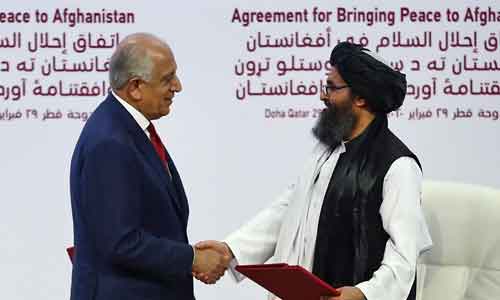the attention of the world has drawn to Taliban Regime in Afghanistan following the attacks on the World Trade Center in September 2001. On October 7, 2001, a US-led military coalition invaded Afghanistan and by the first week of December the Taliban regime had collapsed - Afghanistan became free from the control of world terrorism. Nevertheless, by 2003 with the support of some neighboring countries and regional powers the Taliban group had been re-established responsible for military affairs, culture, finance and political matters. Military affairs and finance focused on fighting and financing the fight. The cultural affairs commission focused on media and communications. Then, they have launched many deadly attacks on their Afghan fellows in different parts of the country, particularly in Kabul city. In the whole, the war of Taliban have had a negative impact on all aspects of life in Afghanistan and have brought more bitterness than ever into the lives of innocent civilians. Taliban group made Afghanistan the scene of the mass killing of civilians. Men, women and children targeted via their suicide attacks constantly. Nonetheless, the miseries of the Taliban insurgent attacks cannot be described in words. One can only feel the pain by listening to the cries of widows, orphans and other victims around the country. Afghans may forgive and forget the oppression allowed by the Soviet-backed regime in the period of 1978 to 1992 but cannot forget the Taliban persecution from (1996 until now). The genocides of Yakaw-lang and Mazar and the horrible violations against the human dignity of the people, still disturb the soul of this nation.
However, After the US and the Taliban signed, “The Agreement for Bringing Peace to Afghanistan in Qatar on December 19, 2020, new wave of violence launched by the Taliban insurgents which embattled the Afghan civilians purposefully as well as the security forces. While Afghan government signal to the Taliban its readiness to negotiate and dialogue by releasing of the prisoners, but there is no signal from the Taliban itself. It is a new challenge on the peace pathway and it may have negative impact on the shape of future talks. Moreover, in media, the Taliban deliver statement that they are looking to end their long-running war that has cost tens of thousands of their Afghan fellows’ lives, but in real world, the Taliban activities do not pursuing peace or fostering dialogue, their behaviors are against all international expectations, Afghan culture code, literature of peace and compromise. In addition, there is no more precise knowledge of the Taliban’s internal dynamics, and its various priorities. The analysis of Taliban’s reaction show that Taliban priority is to take some territory and control it. They have already made the point that they have the military capacity to take some cities. Despite of this fact, using violence is part of the Taliban ideology. Taliban without violence cannot exist. When the Taliban capture cities, they behave violently with the residents. They use enough violence, to ensure the population obeys from their authority. Because the Taliban ambition is to control people – rather than control of territory or popular support – is their priority. They seek to control the population, mainly to prevent people from informing upon them or acting against them. For this reason, the Taliban use outright violence against those they perceive as a threat, which in turn sends a message to the rest of them, with an emphasis on obedience to their orders, such that open disagreement appears and feels un-Islamic. As the result, these offensive behaviors of Taliban may effect on peace initiatives and on the entry to peace process between the Afghan state and the Taliban.
Second challenge is re-centering the regional stage, international interests and roles in peace. Afghans cannot anticipate who are the spoilers and cannot identify who are the supporters as well. Because at present circumstances engaging regional players in Afghanistan is very difficult. The national interests of each regional player is on change and there is no definition or specific regulations to know who wants what; above all the regional powers and the US allies. Nevertheless, each regional player can bring integration and reconstruction theme to the table of negotiation as well as can play a more negative role. It is true that the peace issue is shifted as a global priority today but convergence of interests is not easy task, since self-interest is the macro goal of different parties that are looking for Afghanistan. The principal parties directly or indirectly involved in Afghanistan conflict, whether Afghan or foreign, have a range of political, geo-strategic, economic, social-cultural, reputational and other interests in Afghanistan. An understanding of these interests especially their relative importance to the parties, and whether they converge or diverge, would have influence on any future efforts to resolve the Afghan conflict.
To end with, Afghanistan has two options on the table; the first tactic is uniting the people against the Taliban and responding the Taliban aggressive behavior with violence. As an Afghan proverb says, “the answer for throwing muddy bullet is flinging stony bullet”. The second choice is promotion of possibilities for peace, reconciliation and dialogue. The government can capture citizens’ perspectives on the peace initiatives with the Taliban, the nature of civil society, and the role of the international community. The government know how to base their peace mechanism on a series of consultations with community representative, religious scholars, and tribal leaders; NGO and community activists; teachers and educators; students and youth leaders. As the last point the government of Afghanistan, look at the peace process as an opportunity for establishing a peaceful Afghanistan, but Taliban gaze at peace as a pass to power.
Home » Opinion » Peace is the First Priority for Government of Afghanistan.
Peace is the First Priority for Government of Afghanistan.
| Dawlat Bakhtiari

